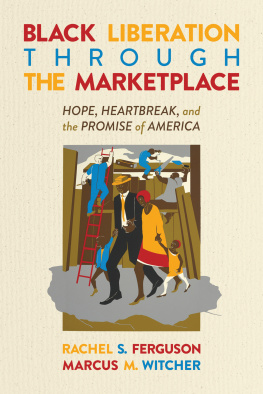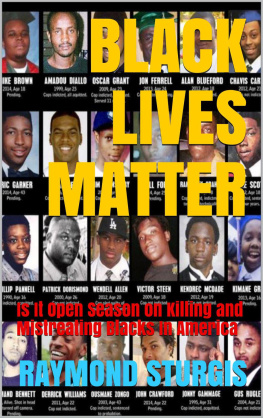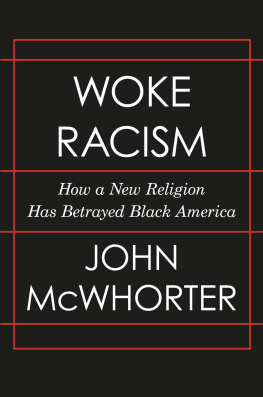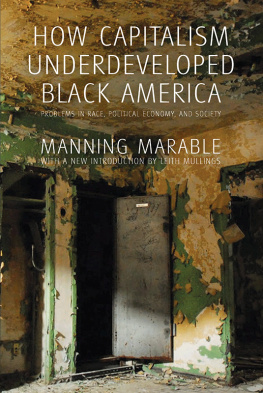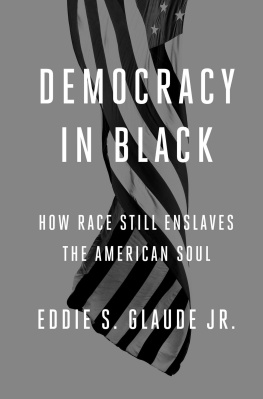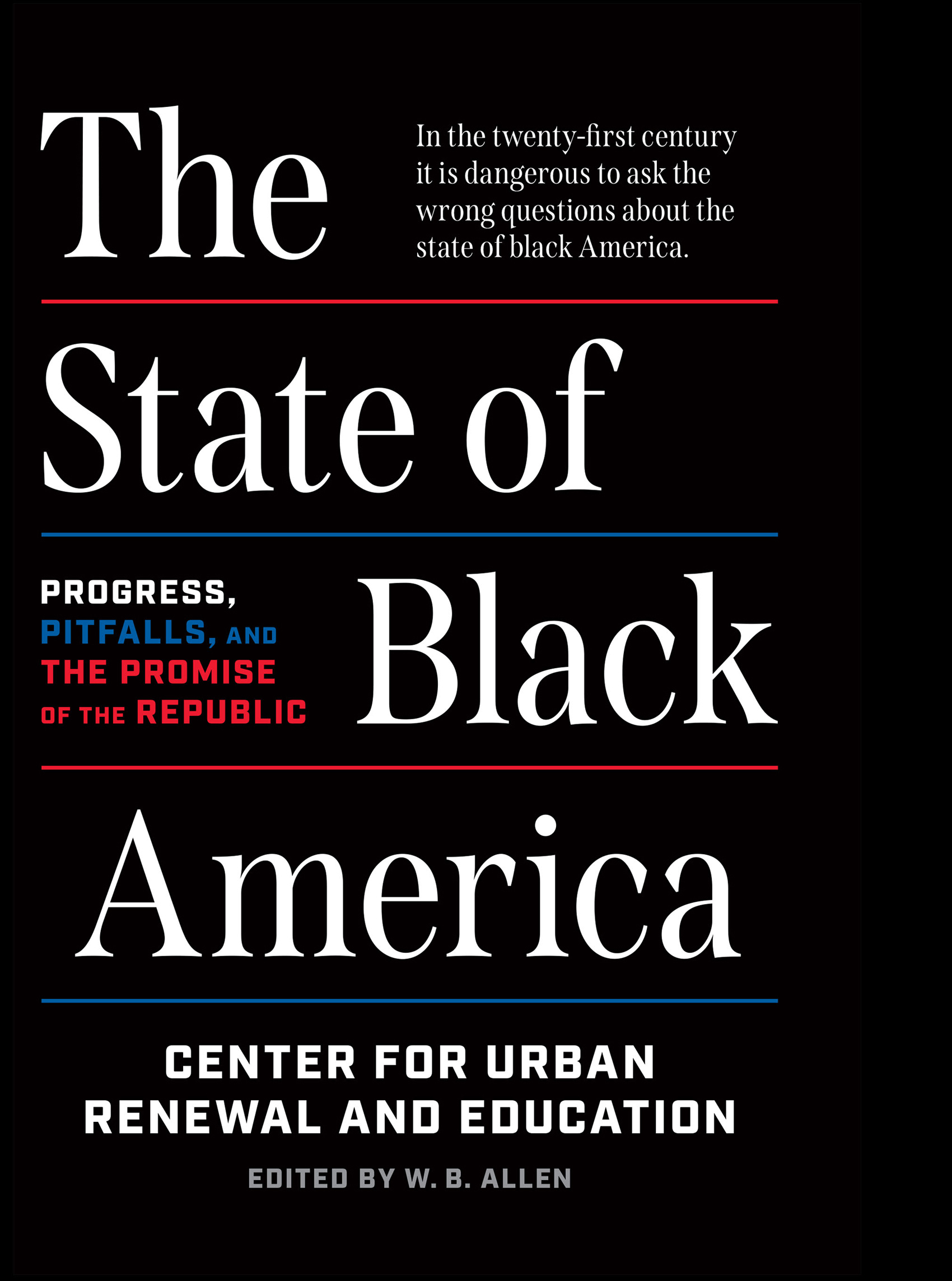Contents
List of Figures
List of Tables
Guide
Pagebreaks of the print version
The StateOFBlack America
PROGRESS, PITFALLS, AND THE PROMISEOF THE REPUBLIC
CENTER FOR URBAN RENEWALAND EDUCATION
Edited by William B. Allen
With the Assistance of the Claremont Institutefor the Study of Statesmanship and Political Philosophy

Copyright 2022 by Center for Urban Renewal and Education the individual chapters, the individual authors
All rights reserved. No part of this publication may be reproduced, stored in a retrieval system, or transmitted, in any form or by any means, electronic, mechanical, photocopying, recording, or otherwise, without the prior written permission of Encounter Books, 900 Broadway, Suite 601, New York, New York, 10003.
First American edition published in 2022 by Encounter Books, an activity of Encounter for Culture and Education, Inc., a nonprofit, tax-exempt corporation.
Encounter Books website address: www.encounterbooks.com
Center for Urban Renewal and Education website address: www.curepolicy.org
Manufactured in the United States and printed on acid-free paper. The paper used in this publication meets the minimum requirements of ANSI/NISO Z39.481992 (R 1997) (Permanence of Paper).
FIRST AMERICAN EDITION
LIBRARY OF CONGRESS CATALOGING-IN-PUBLICATION DATA
Names: Center for Urban Renewal and Education (Washington, D.C.), author.
Allen, W. B. (William Barclay), 1944 editor.
Title: The State of Black America: Progress, Pitfalls, and the Promise of the Republic / by the Center for Urban Renewal and Education; edited by W. B. Allen; with the assistance of the Claremont Institute for the Study of Statesmanship and Political Philosophy.
Description: First American edition. | New York: Encounter Books, 2022.
Includes bibliographical references and index. | Identifiers: LCCN 2021048435 (print) LCCN 2021048436 (ebook) | ISBN 9781641772662 (hardcover) | ISBN 9781641772679 (ebook)
Subjects: LCSH: African AmericansSocial conditionsHistory. | African AmericansCultural assimilationHistory. | African AmericansEconomic conditionsHistory. | United StatesRace relationsPolitical aspects.
Race awarenessUnited States.
Classification: LCC E185.86 .C394 2022 (print) | LCC E185.86 (ebook) | DDC 305.896/073dc23/eng/20211007
LC record available at https://lccn.loc.gov/2021048435
LC ebook record available at https://lccn.loc.gov/2021048436
1 2 3 4 5 6 7 8 9 20 22
This book is dedicated to Star Parker, president and founder of the Center for Urban Renewal and Education (CURE). Her ceaseless efforts, personal sacrifice, and uncompromising ideals are the heart of CURE and this groundbreaking new publication. The State of Black America is a testament to Stars unswerving belief in our nations ideals.
Who can find a woman of valor? For her value is far above rubiesGrace is deceitful, and beauty is vain, but a woman who fears the LORD, she shall be praised. Give her the fruit of her hands, and let her deeds praise her in the gates. Proverbs 31:10, 3031
CONTENTS
- Thomas Klingenstein
- Mikael Rose Good
- W. B. Allen with Mikael Rose Good
- Edward J. Erler
- Robert D. Bland
- W. B. Allen
- Glenn C. Loury
- Ian V. Rowe
- Precious D. Hall and Daphne Cooper
- Star Parker with Robert Borens
FOREWORD
Thomas Klingenstein
We find ourselves in a cold civil war. The enemywhat I call Woke Communists, Woke Comms for shortwant to destroy the American way of life. To this end, the Woke Comm must convince Americans that their country is systemically racist, in particular, that black Americans are oppressed by white Americans. If we are to preserve America, we must defeat this lie. The fact is, black Americans are not oppressed. Opportunities for black Americans have never been better. Our leaders must say these thingsloudly and often.
Rebutting the lie requires describing the current state of black America. This is the purpose of the volume you hold in your hands.
The war is between those who believe that America is built on freedom and those who believe that America is built on oppression and exploitation; those who are convinced that America is good and those who are convinced that America is bad. These differences are too large to bridge. One side or the other must prevail. This is what makes it a war, if still a cold civil war.
The Woke Comms seek to impose a totalitarian regime. In a traditional totalitarian regime, the government uses repression to control every aspect of public and private life, all the way down to Little League.
In America, the government does not control everything, but it influences a lot. And where the government leaves off, the cultural/business complex takes over. Education, corporate media, entertainment, big business (especially Big Tech), and the military to varying degrees align with the Democratic Party, which has become, effectively, a subsidiary of the Woke Comms. These institutionstogether with the governmentfunction as a totalitarian regime, crafting narratives to advance their agenda and suppressing narratives that do not. Canceling replaces violence.
At the center of the Woke Comm strategy for overturning the American way of life is the sweeping claim that America is systemically racist. This claim, in turn, is a justification for overturning not just specific policies but the entire American way of life. After all, if, as the Woke Comms contend, racism is systemic, if it has insinuated itself into all the values and institutions that make up the American way of life, then obviously we must throw out that way of life. That America is systemically racist is the foundational claim of the Woke Comm narrative that America was conceived in oppression. This narrative includes many other claims that support the big claim. These claims are false and American patriots must expose them as such.
In addition to promoting a false narrative, the Woke Communists try to silence those who challenge it. Today, anyone who dares to challenge the dominant story about race is called a racist, shamed, canceled, or denied access to social media. As a result, many have been intimidated into silence. But the cost of silence is very high. When we fail to rebut lies, we perpetuate them.
Thus, we owe a great debt to the essayists in this volume who refute the lies without flinching or pulling punches. Unlike the Woke Comms, they provide evidence for their claims. They understand that we must sustain our traditional narrative, that of a country striving, however imperfectly, toward its noble ideals. If instead we succumb to the Woke Communist narrative, we will lose America.
We Must Change the Narrative
Preserving our traditional narrative requires that we teach it to our citizens, future and current. We must choose between our narrative and theirs.
Is the narrative going to be, as the Woke Communists have it, that racism runs in Americas DNA? Or is it going to be truth: that freedom and the principles of the American founding run in our DNA, and that these principles have been the greatest force for human liberty on the planet? We must follow Edward J. Erler, who shows why Americas founding principles provide the best opportunity for blacks and everyone else.



